Mailer 2 is out. You can check it by clicking here: Mailer 2
Competitions
2026 ASCE Society Competitions Hosted at Pacific Southwest

ASCE Concrete Canoe Competition
Since the early 1970s, American Society of Civil Engineers (ASCE) student chapters have competed to be the best at designing, constructing, and racing concrete canoes. During that time, canoe mixtures and designs have varied, but the long-established tradition of teamwork, camaraderie, and spirited competition has been constant. Each year, teams, their associates, judges, and other participants build upon this tradition. This year, teams answered a call for Technical Proposals and Enhanced Focus Area Reports and are competing to be the winning bid on a prototype standardized canoe design for future concrete canoe competitions. Learn more about the competition.
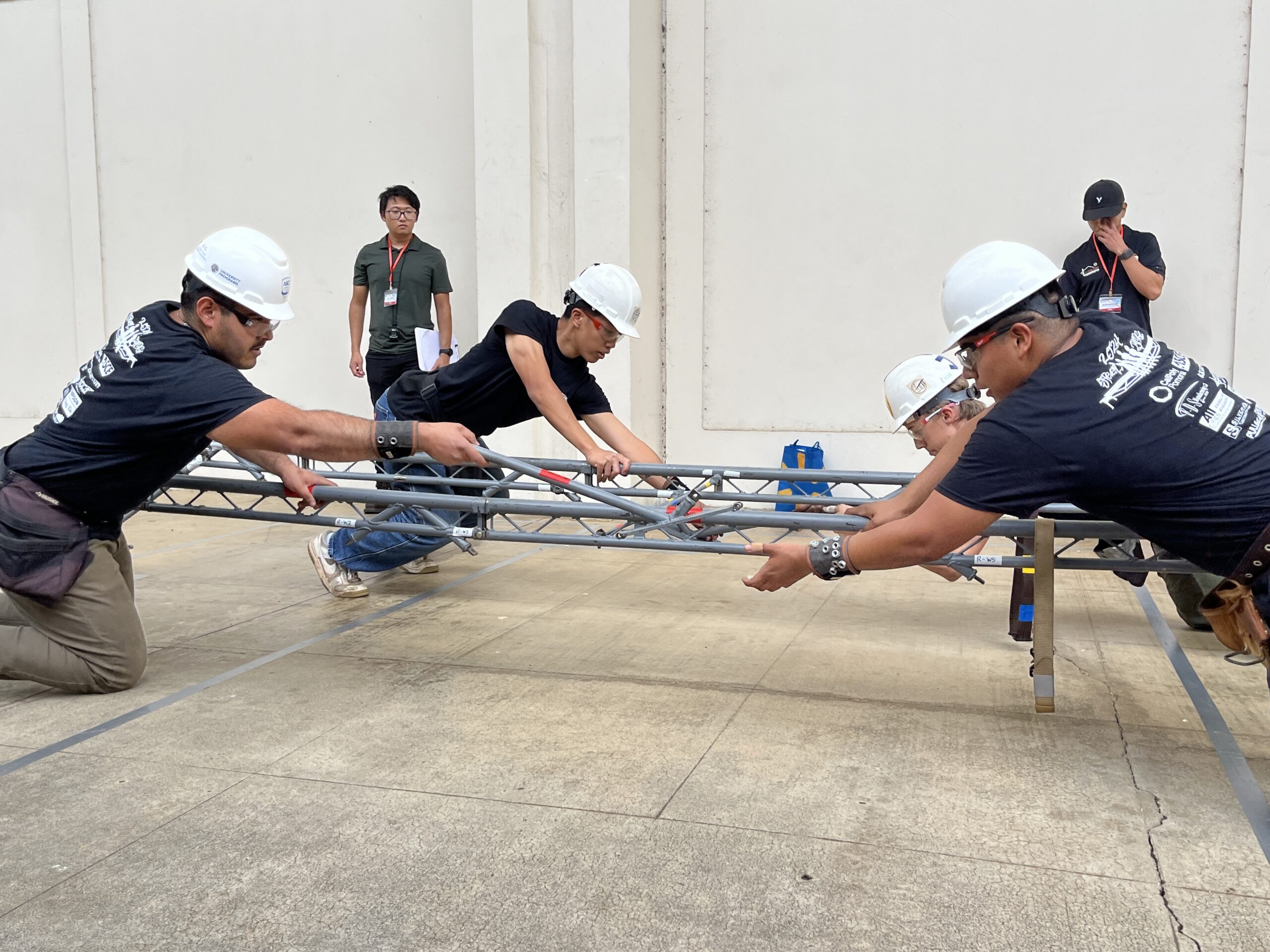
AISC/ASCE Student Steel Bridge Competition
ASCE and the American Institute of Steel Construction (AISC) are partnering to offer the Student Steel Bridge Competition (SSBC) at ASCE Student Symposia.
The Student Steel Bridge Competition challenges students to extend their classroom knowledge to a practical and hands-on steel-design project that grows their interpersonal and professional skills, encourages innovation, and fosters impactful relationships between students and industry professionals.
Each student team develops a concept for a scale-model steel bridge to span approximately 20 feet and to carry 2,500 pounds according to the competition rules. The team must determine how to fabricate their bridge and then plan for an efficient assembly under timed construction conditions at the competition. Bridges are also load-tested, weighed, and judged on aesthetics.
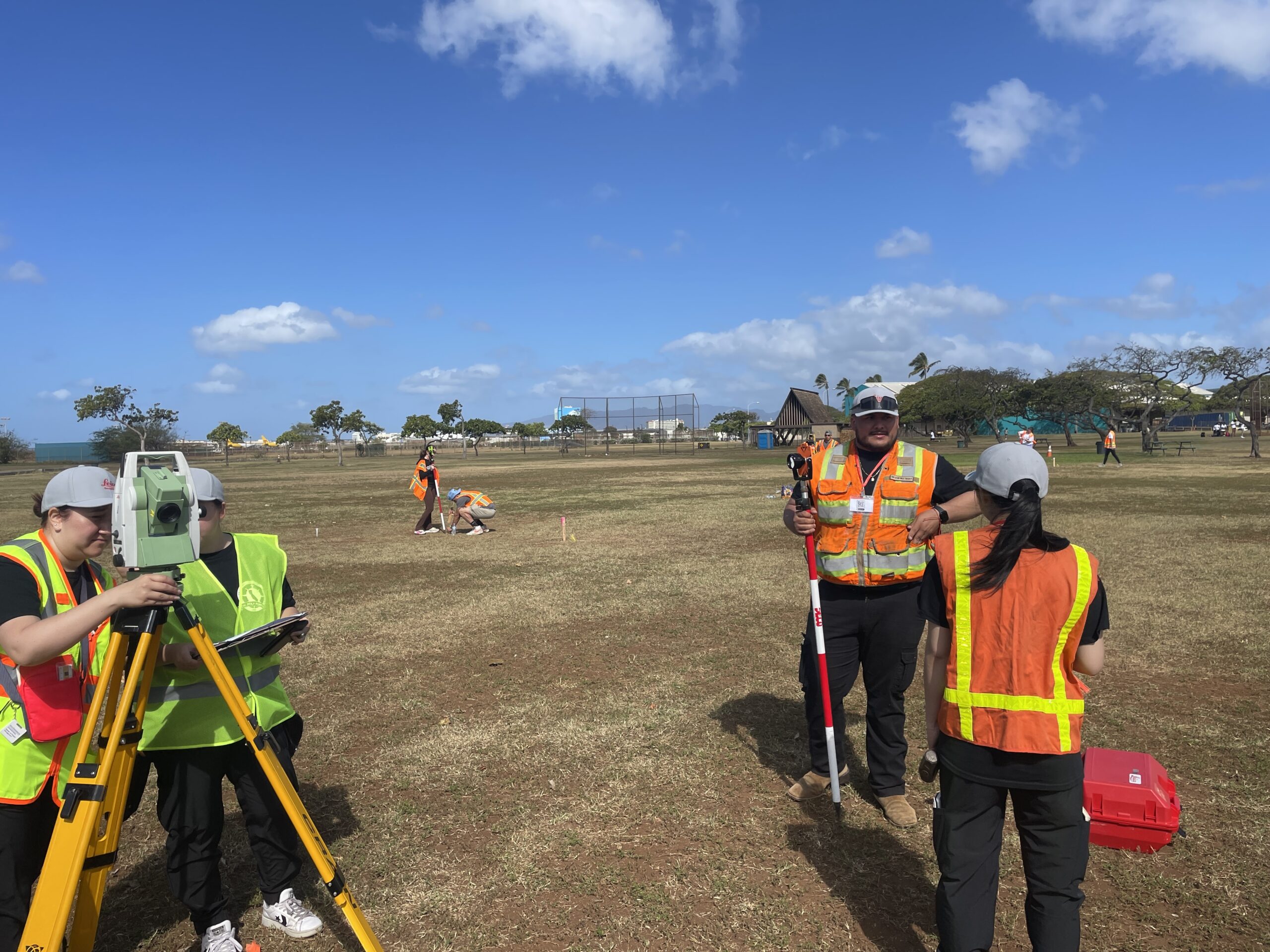
ASCE UESI Surveying Competition
The ASCE UESI Surveying Competition’s educational and professional goals include a recognition of the importance of basic surveying principles to all civil engineering projects. Students will be required to use standard field and office equipment and procedures to solve common problems encountered in industry. A clear understanding of and ability to apply basic surveying principles will assist the graduate civil engineer in communicating and working with the surveying professionals on the job site and during the design process. Learn more about the competition.

Timber-Strong Design Build Competition (pilot)
ASCE has partnered with the American Wood Council (AWC), APA – Engineered Wood Association (APA), and Simpson Strong-Tie (SST) to pilot the Timber-Strong Design Build℠ (TSDB℠) Competition. The competition seeks student teams to design and build an artistically creative, two-story wood, light-framed building that is sustainable, aesthetically pleasing, and structurally durable.
This competition will continue to be offered as a pilot competition in 2026.
Learn more about the competition partners:
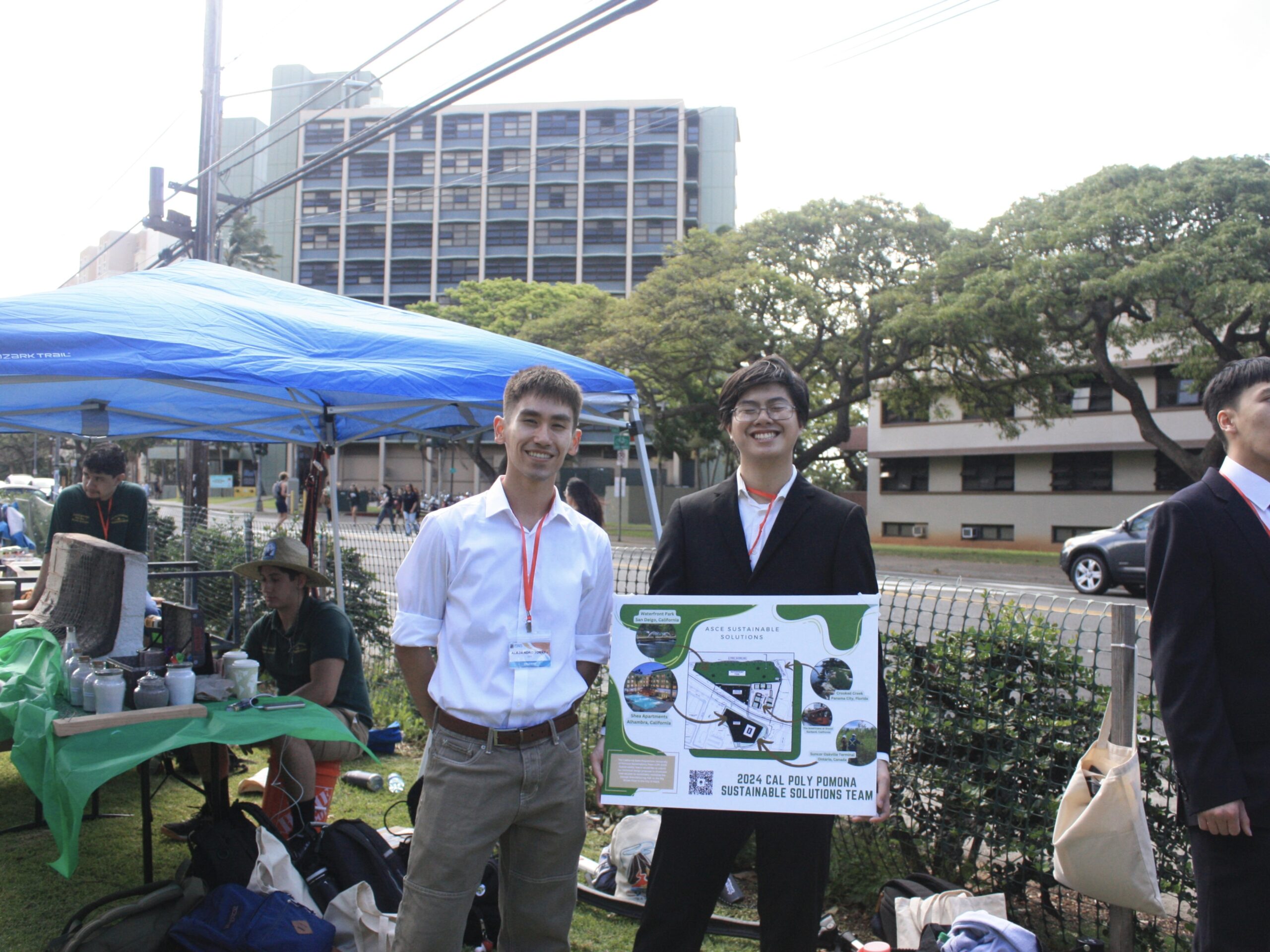
ASCE Sustainable Solutions Competition
The ASCE Sustainable Solutions Competition challenges students to develop a stronger understanding of sustainability and learn to incorporate sustainable solutions into everyday problems that engineers incur. Students are encouraged to be creative in their solutions and use all resources available. Learn more about the competition.
2026 Topic
The CE Computing Corporation (CECC) is requesting proposals for professional civil engineering services and sustainability consulting services to construct a new data center within the City of ASCE. The CECC board of directors has approved enhanced sustainability goals for the proposed data center, including using the Institute for Sustainable Infrastructure’s Envision as the primary sustainability framework.
Symposium Paper
The ASCE Student Symposium Paper Competition emphasizes the importance of being able to write and present a paper as essential communication skills for all engineers and often necessary for advancement in your career.
Good faith participation in the ASCE Student Symposium Paper Competition, including submission and presentation by at least one (1) member of the ASCE Student Chapter, is a requirement to advance to an ASCE Society-wide Competition Finals. Competitions requiring this include Concrete Canoe, Student Steel Bridge, UESI Surveying, and Sustainable Solutions.
No other Society-wide competition report or paper may serve as a submission for the ASCE Student Symposium Paper Competition. Learn more about the competition.
Student Symposium Paper Competition topic:
Engineering the Public Welfare: How Civil Engineers Engage and Advance Communities Through Ethical Infrastructure Design in accordance with the ASCE Code of Ethics
Civil engineering is not only about the design and construction of vertical and horizontal infrastructure. It is an essential part of shaping communities and building a better quality of life for all persons. In this essay, critically analyze the ethical responsibility of civil engineers to recognize the historical, cultural, and social needs of a community and to incorporate those considerations into their work. Discuss how civil engineers can engage with communities to develop solutions that protect historical and cultural resources, improve access and mobility, and expand economic and social opportunities. Use real-world examples and reflect on how emerging technologies and policies can support these objectives.
Authors are encouraged to develop and apply their own original thoughts. The use of generative artificial intelligence (AI) and natural language processing models (NLP), such as OpenAI’s ChatGPT©, is neither encouraged nor discouraged. However, if such models are used, all instances shall be cited as work completed by the respective generative AI/NLP. Failure to cite all instances of generative AI/NLP use will be considered plagiarism
Submission Due Date: March 1st
Submission email: TBD
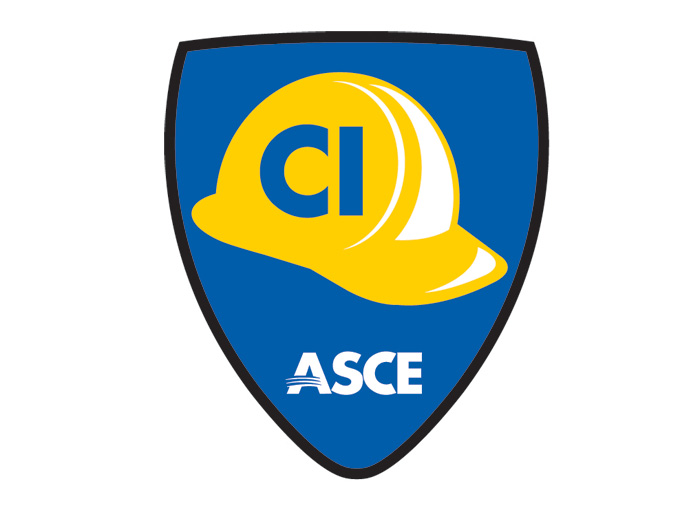
ASCE Construction Institute Student Symposium Competition
Each year, the ASCE Construction Institute (CI) Student Symposium Competition challenges students to step into the role of professional construction engineers and managers, simulating the dynamic environment of a real-world construction firm. In this competition, students are presented with a practical and technically demanding engineering scenario—often modeled after challenges faced by industry professionals—and are tasked with preparing a complete and professional response to a client’s or owner’s request for proposal (RFP).
Participants must work collaboratively under time constraints to develop innovative, accurate, and well-structured solutions that demonstrate their understanding of construction engineering, project management, cost estimating, scheduling, and sustainability principles. The competition not only tests technical knowledge but also emphasizes communication, teamwork, and problem-solving under pressure—skills essential to success in the construction industry.
Beyond the competition itself, the CI Student Symposium serves as an invaluable platform for students to connect with industry professionals, gain exposure to real-world project delivery methods, and experience the full project lifecycle from planning to presentation. By integrating both civil and construction engineering disciplines, the event fosters a deeper appreciation of how technical design and construction management intersect in practice. Ultimately, it strengthens student engagement with the construction industry and highlights the Construction Institute’s ongoing commitment to advancing education, innovation, and leadership among the next generation of engineers and builders.
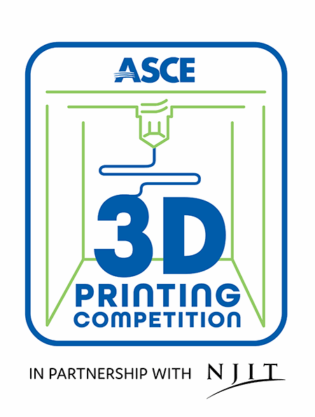
ASCE 3D Printing Competition
The ASCE 3D Printing Competition encourages the creative and practical application of additive manufacturing technologies within the field of civil and structural engineering. This innovative competition challenges students to explore how 3D printing can transform traditional design and construction processes by promoting precision, efficiency, and sustainability in modern engineering practice.
For 2026, the theme “Bridging the Future” places a special focus on the design and fabrication of bridges. Competing teams will be tasked with developing a 3D-printed bridge that is not only structurally efficient and durable but also demonstrates aesthetic appeal, constructability, and creativity. The bridge must satisfy specific geometric and dimensional requirements while being assembled in the shortest possible time. Through this challenge, students must balance form and function—creating a bridge that showcases both engineering excellence and design innovation.
Beyond technical performance, the competition highlights the evolving role of 3D printing in civil infrastructure, encouraging students to think critically about material selection, print orientation, and assembly techniques. It provides a platform for participants to engage in hands-on design, testing, and optimization while developing essential teamwork and problem-solving skills. Ultimately, the ASCE 3D Printing Competition inspires future engineers to embrace emerging technologies that will shape the future of construction and structural design, pushing the boundaries of what is possible in the built environment.
Regional Competitions
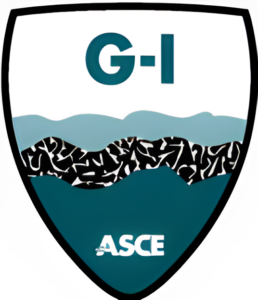
ASCE Geo-Institute Geowall Competition
The GeoWall Competition is a design, analysis, and build test challenge that simulates the behavior of a mechanically stabilized earth (MSE) retaining wall at model scale. Students are asked to behave like practicing geotechnical engineers, balancing soil mechanics, structural stability, and material efficiency.
Rather than relying on the strength of concrete or steel members, the GeoWall Competition emphasizes soil-reinforcement interaction, a fundamental aspect of geotechnical engineering. Teams must understand how tensile reinforcement interacts with surrounding soil to form a stable composite mass, where resistance to earth pressures is provided by friction, confinement, and shear transfer rather than by material strength alone.
The success of a GeoWall design depends on proper reinforcement spacing, embedment length, and placement within the soil mass to effectively control deformation and prevent pullout or internal failure. This approach mirrors real-world behavior of mechanically stabilized earth walls and challenges students to apply geotechnical theory, engineering judgment, and material efficiency to achieve safe, optimized designs.
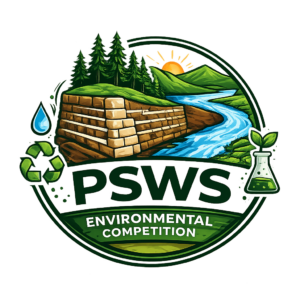
PSWS Environmental Competition
The PSWS 2026 Environmental Design Competition challenges student teams to design, construct, and operate a small-scale constructed wetland system capable of improving the quality of reverse osmosis (RO) reject water using sustainable, nature-based treatment processes. Teams apply principles of environmental engineering, hydraulics, chemistry, and biological treatment to demonstrate measurable improvements in water quality parameters such as turbidity, solids, organic content, pH, and dissolved oxygen.
Participants will design and build a compact wetland system within defined size constraints, operate their system on competition day, and analyze influent and effluent water samples to evaluate treatment performance. Judging emphasizes technical reasoning, innovation, system functionality, data analysis, communication, and safety, rather than achieving extreme treatment results. Teams must also submit a concise design report and present their results to judges using a visual poster.
This competition reflects real-world engineering challenges related to water reuse, desalination byproduct management, and sustainability, providing students with hands-on experience in environmental process design, experimental evaluation, and professional engineering communication. All participants are required to follow strict safety and ethical guidelines throughout design, construction, and testing.
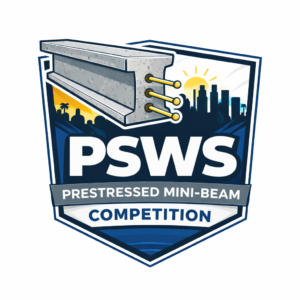
PSWS Prestressed Mini-Beam Competition
The PSWS 2026 Prestressed Mini-Beam Competition challenges student teams to design and construct a precast, prestressed concrete beam using innovative methods that simulate real-world structural engineering practices. In this hands-on competition, teams use tensioned bass guitar strings as prestressing tendons to introduce compressive forces into a concrete beam cast onsite at the symposium.
Teams are responsible for designing the beam cross-section within strict dimensional and material limits, casting the beam on Day One, and completing all design calculations prior to testing. On the following day, beams are evaluated under simply supported, center-point loading until failure to determine the ultimate load capacity. Scoring is based on both structural performance and engineering accuracy, emphasizing how closely a team’s predicted capacity matches the measured test results.
The competition highlights key concepts in prestressed concrete behavior, structural analysis, construction sequencing, and quality control, while reinforcing teamwork, safety, and clear engineering communication. By combining theory with physical testing, the Prestressed Mini-Beam Competition provides students with a realistic and engaging introduction to prestressed concrete design.
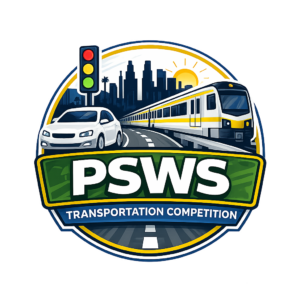
PSWS Transportation Competition
The PSWS 2026 Transportation Competition challenges student teams to develop a conceptual transportation planning and design solution that transforms a defunded freeway corridor into an active transportation network focused on bicycle, pedestrian, and transit connectivity. Acting as a consulting transportation engineering firm, teams integrate planning, geometric design, accessibility, and policy considerations to propose feasible improvements that serve both local communities and regional transit systems.
Using the former State Route 710 South Stub in the Los Angeles, Alhambra, and Monterey Park area as the project site, teams evaluate existing constraints and stakeholder needs to recommend pedestrian and bicycle connections to surrounding neighborhoods, arterial streets, and major transit hubs, including Cal State LA. Designs must comply with applicable Caltrans Highway Design Manual standards, ADA accessibility requirements, and public right-of-way constraints while emphasizing practicality, safety, and community benefit.
Teams submit a comprehensive design report and deliver a formal presentation outlining their project understanding, design approach, challenges, and high-level benefit–cost analysis. Judging emphasizes problem-solving, technical reasoning, communication, feasibility, and quality of recommendations, rather than final design-level calculations.
This competition reflects real-world transportation engineering practice by addressing multimodal mobility, equity, and sustainable urban infrastructure planning through a realistic, policy-driven case study.
